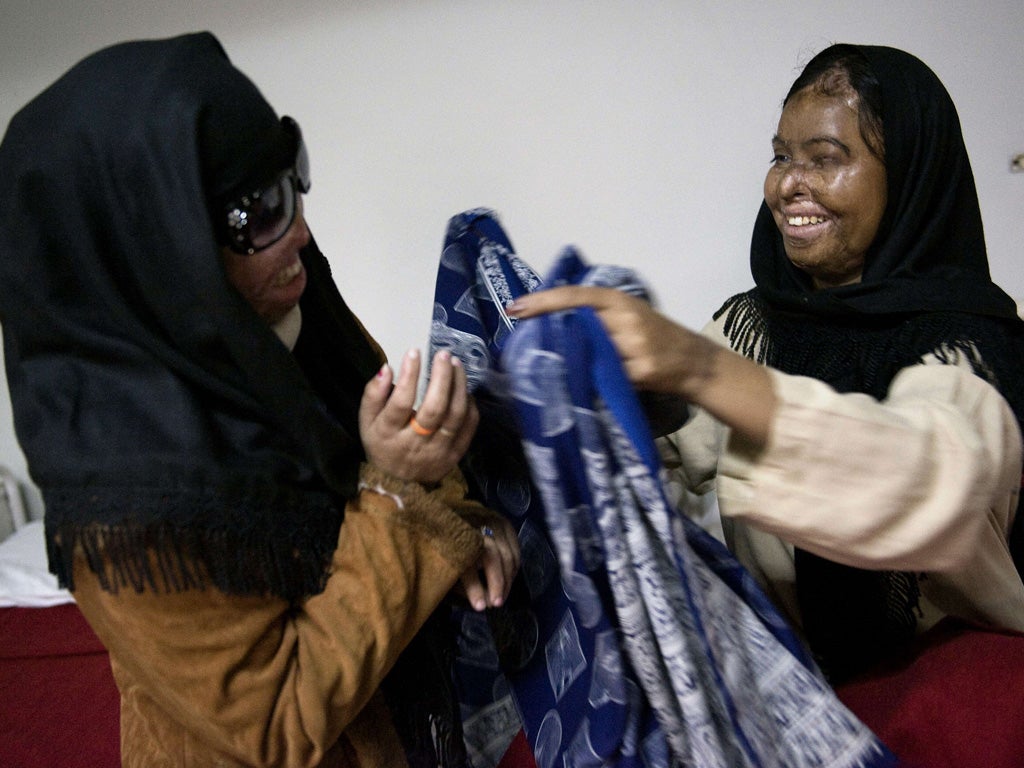Acid attack victims fight to stop release of their film in Pakistan
Women fear being ostracised if Oscar winning documentary is screened in homeland

Pakistani acid attack victims who were featured in an Oscar-winning documentary are taking legal action to stop the film from being shown in their country, amid fears they may be shunned by their communities.
Pakistani acid attack victims who were featured in an Oscar-winning documentary are taking legal action to stop the film from being shown in their country, amid fears they may be shunned by their communities.
The women, who appear in Saving Face, claim the documentary-makers promised it would not be shown in Pakistan unless each of the acid attack survivors gave their approval.
But the film-makers, Sharmeen Obaid Chinoy and Daniel Junge, have rejected the allegations, saying that everyone who participated signed legal release forms.
The row has plunged into controversy what had previously been a cause for national celebration. When the 40-minute film won the Best Documentary at February’s Oscar awards, the members of the Acid Survivors Foundation Pakistan (ASF) were among millions across the country who cheered.
The film told the story of two central characters, Zakia and Rukhsana, who had acid thrown at them by their husbands and whose faces were remade by a British Pakistani plastic surgeon, Mohammad Jawad. But some of the women, whose faces were destroyed, believe if the film is shown in Pakistan they could be ostracised by their conservative rural communities.
“We had no idea it would be a hit and win an Oscar. It’s completely wrong. We never allowed them to show this film in Pakistan,” Naila Farhat, 22, who features briefly in the film, told the Agence France-Presse. Ms Farhat, who was 13 when a man she refused to marry threw acid in her face, added: “This is disrespect to my family, to my relatives and they’ll make an issue of it. You know what it’s like in Pakistan. They gossip all the time if they see a woman in a film.”
The ASF failed to respond to inquiries yesterday. But its lawyer, Naveed Muzaffar Khan, said he had sent legal notices to the film-makers. Speaking from Islamabad, Mr Khan claimed the women had been given written undertakings from the documentary-makers that the film would not be shown in Pakistan unless everyone agreed. He said those documents were now with the courts. “[The women] come from a rural background and their families will be threatened if the movie is screened,” he added.
In a statement, Ms Obaid Chinoy and Mr Junge dismissed what they said were “false allegations”. “We would like to state emphatically that all subjects were informed of our intention to release the film globally, including Pakistan, and that all subjects signed a release to this effect,” they said.
They said copies could be obtained through a Pakistan-based lawyer, who could not yesterday be reached.
The film-makers also said that contrary to claims, they had not made financial commitments to the women. However, they had raised money for the two main characters portrayed in the documentary.
They added: “We believe it will be very unfortunate if Saving Face is not released in its home country. As human rights film-makers with an established record of change-making films, we believe the media has a role in illuminating human rights abuses, not hide them away. Furthermore we believe the Pakistani public who have shown overwhelming support deserve to see the country’s first Oscar-winning film.”
Subscribe to Independent Premium to bookmark this article
Want to bookmark your favourite articles and stories to read or reference later? Start your Independent Premium subscription today.

Join our commenting forum
Join thought-provoking conversations, follow other Independent readers and see their replies